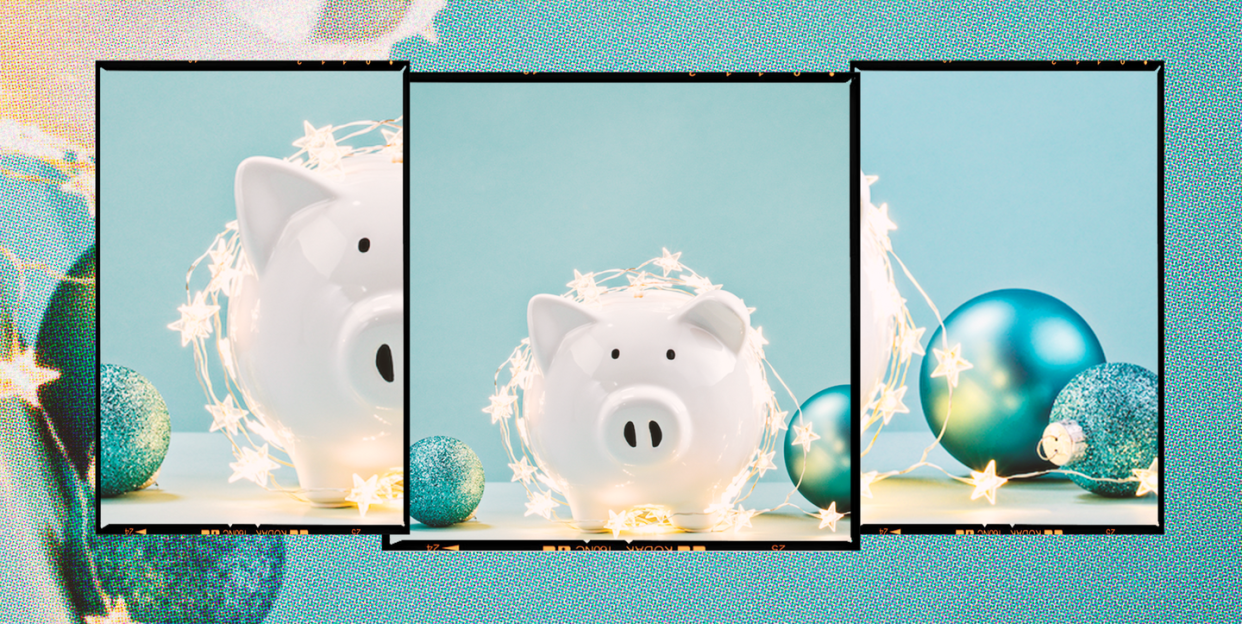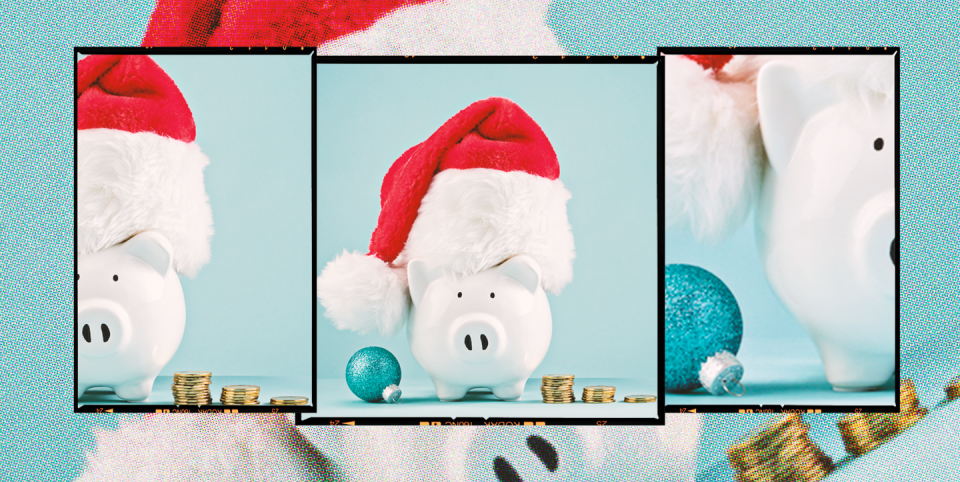How to make your December salary streeeeetch until January

Christmas is just around the corner, and that (hopefully) means attending all the parties, eating all the food and buying all the presents. But all that festive fun comes at a cost, and – although many employers helpfully dish out December's pay a little earlier to cover it – that can often leave us stretched for cash by the time January rolls around. Especially this year, given the ongoing cost of living crisis is having an impact on everyone's finances.
With that in mind, and with December's salary dropping any day now, we spoke to the finance experts over at financial education app, Your Juno, to find out how to make that festive pay check tide us over until January.
How to make your December salary last until January
Pots are pals
It's no secret that creating a budget – and sticking to it – is tricky, especially around the festive season. Enter: budget pots. Yep, many online banks now offer nifty little pots that you can separate your money into to help you budget more efficiently.
"We all know the love-hate relationship we have with budgeting. Yet when it comes to having a successful Christmas without a financial hangover in January, you’ll want to apply this technique," says Your Juno founder, Margot De Broglie. "The first step is making sure you’ve got your needs covered for December and January," she adds, pointing out that this includes: rent; transport; food; phone bills; utility bills; council tax; and minimum payments on credit cards."
"With some heavy-lifters nestled in here, like rent and transport, these will naturally form the juiciest part of your flow," De Broglie tells Cosmopolitan UK. "Go through your previous months of past spending, and calculate how much you usually spend in these categories. You’ll want to open a separate pot to cover these expenses. Why? Because it’ll be much more tempting to dip into this money if it’s just sitting in one account."
Once you've got the essentials covered, De Broglie says you can start mapping out your wants and 'future you' money. "Wants is where all the fun stuff happens," she adds, explaining that eating out, gifts and weekend trips all come under this category. "'Future you is where you save for long-term goals like a house deposit, getting out of debt or an emergency fund."
Under normal circumstances, De Broglie recommends the 50/30/20 budgeting rule – allocating 50% of your income on your needs, 30% on wants and 20% on 'future you' – but says you can "adjust this rule to give you a bit more flexibility in December, as long as this will not affect long-term financial situations."
So, what bank is best for setting up budgeting pots? "When choosing which bank to use for these separate accounts, you have lots of options," De Broglie notes. "The more traditional older banks like Barclays, Lloyds and Santander are being challenged by neo-banks or 'challenger' banks like Revolut, Monzo, Wise and Starling Bank. They often have more friendly interfaces, and lower fees than the big banks. You might even cash in with a switching bonus of up to £150 by opening one of these new accounts!" If you're unsure, De Broglie advises using comparison sites like Money Saving Expert to find the best deals.
Ring the alarm
"Set up online banking alerts to keep track of what you’re spending throughout the month," De Broglie reminds us. "You can put a spending budget into your mobile banking app and turn on text alerts for when you reach your limit."
Spend-free socialising
When it comes to Christmas, budgeting can only get you so far, especially if you're on a lower income and simply can't afford to do everything. If this is the position you've found yourself in this festive season – we've all been there! – be sure to suggest Christmas socialising activities that'll have less of a dent on your bank balance.
Some of our spend-free socialising faves include going on a walk in your local area to check out all the festive light displays, having friends over for a board game marathon and spending an afternoon at a gallery followed by a meal deal picnic and a festive mince pie – yep, winter picnics are definitely a thing!
Alternative gifting
On the topic of spending as little as possible over the festive period, rethinking how you gift this Christmas is a good shout. See what you can find at your local charity shops, or regift the presents you got last year that have since gathered dust on top of your wardrobe.
Alternatively, De Broglie suggests setting a Christmas gift spending limit with your loved ones. "Agreeing on gift price limits with family and friends means that you don’t have to worry about someone buying you something much more expensive than what you got them," she tells us. "Setting a budget removes any guilt about prices and sets up a much more wholesome and thoughtful gifting environment," De Broglie adds, reminding us that: "People also tend to get more creative when there is a budget in place."
As for what that budget might look like, the expert says: "There really is no reasonable number when it comes to a budget – anything works! Some people might choose to gift each other DIY items or a Spotify playlist. Others might agree to do a book exchange with someone."
There's also the option to organise a Secret Santa, which De Broglie explains "would mean that each person pulls a name out of a hat and gets assigned one person to give a gift to. Instead of buying gifts for every family member or friend, each person only buys something for one other."
Rack up the points
If you are going to be shopping for Christmas presents, you can still save money by being more mindful about where you shop. Many stores now offer loyalty schemes that will reward you for shopping with money off or discounted prices. Some of the best loyalty schemes out there right now include Tesco Clubcard and Boots Advantage Points.
You could also consider signing up to a cash back scheme, De Broglie suggests. "Explore cash back websites that allow you to get a small amount of money back when you shop at partner retailers like Amazon or M&S," she says. "Quidco and TopCashBack are websites that could get you as much as 40% cash back when you buy promoted deals."

Conversations with friends
One of the major hurdles that those on a budget face is overcoming the stigma around money. "It’s easy to overlook the fact that you and your friends could all be on very different budgets or have very different mindsets when it comes to spending money," De Broglie points out.
"It’s important to have transparent conversations about this and make sure that no one feels judged," the expert advises. "Don’t make assumptions about how much your friends have, just because of how much they earn or the way they choose to spend. You don’t know what their priorities are, whether they have dependencies or whether they struggle with debt."
If you do find yourself in a situation where your friends have planned a festive get together that you simply can't afford, "you can suggest a more affordable alternative," De Broglie says. "You could say 'I’m on a tighter budget this month, so I’ll skip out on the meal, but count me in for a movie next week'."
Still haven't got enough money come January? Here's what to do...
In January, if you do find yourself with too much month left at the end of the money, here's De Broglie's advice:
"Avoid using short term credit that will impact your credit score," she says. "Payday loans can stay on your record for up to six years and will be a red flag for mortgage providers. If you need to dip into your overdraft, communicate with your bank as much as possible."
"Take on 'No Spend days' in January – days where you try to spend absolutely no money. By turning it into a challenge, it can make a bleak period feel a bit less stressful!"
"Meal prep and batch cook – this takes a little organisation but it can be a game changer. Not only do you save on groceries but you save time! Make sure you use up all the food you buy. You can get creative with your surplus."
"Get the benefits you’re entitled to," De Broglie stresses. "Do your research, you might be entitled to more than you think. If you’ve been working from home, you’re entitled to £6/week tax relief from April 2020."
If you're struggling with your bills, you can speak to a number of charities – including Turn2us and the Independent Food Aid Network – set up to help those during the cost-of-living crisis, as well as debt-management charities like Step Change.
You Might Also Like


